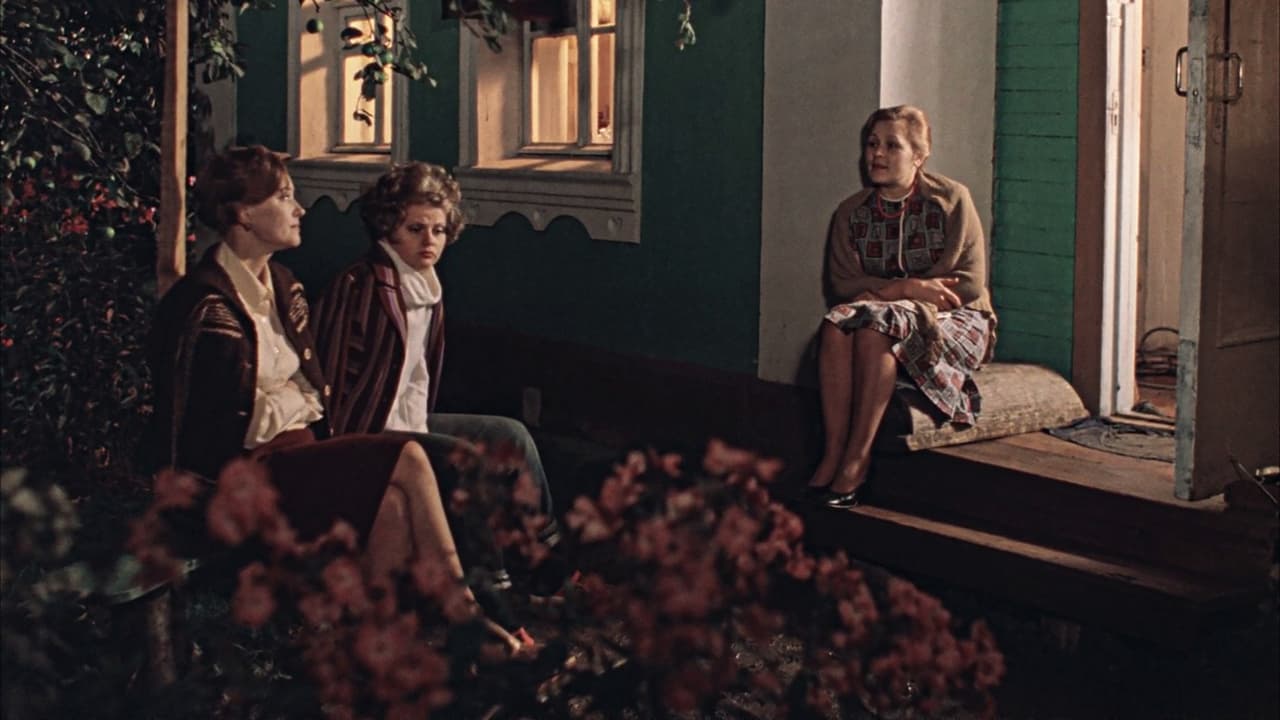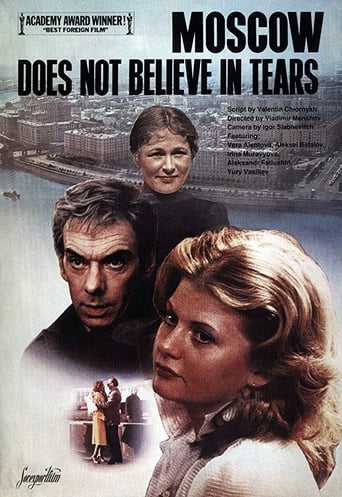

During the Cold War, not much, was known about life in the Soviet Union to western audiences. Even least was known about life for Soviet women. There were very few movies at the time, that capture how Russian women were treated. Most films from that era, were highly narrow formula propaganda stories of socialist realism. It wasn't until Brezhnev Era, that cinema got expand its boundaries, and begin work on a wider range of entertaining and artistic films. It was here, that filmmakers started to developed stories that intense focus on Soviet personal life. One of those films, was 1979's Moscow does not believe in tears. Director by Vladimir Menshov and written by Valentin Chernykh, the movie tells the 20 years story of three Russian women who come to Moscow from smaller towns: Katerina Tikhomirova (Vera Alentova), Lyudmila (Irina Muravyova), and Antonina (Raisa Ryazanova) in search for better life. Only to find that the search is more complex, than they thought. Without spoiling the movie too much, I have to say that the first half of the film, set in the 1959s, during Khrushchev Thaw, was really dull and boring. It's really a shame, because it would be, nice to see, more on these women's reaction, to the change in reform in their country since De-Stalinization. It would have been better, if the movie set the events during the 1963's Cuban Mission Crisis. It would be, nice to see, how the average soviet citizen was thinking of the event. Sadly, film content like that, would more likely be heavily circumscribed and subject to censorship and bureaucratic state control. Instead, the film doesn't get good, until the movie took a 20 year leap forward in time, to 1979. It's here, that one of the women's stories really outshine the others. In my opinion, the movie should have been all about Katerina's struggles. Not only, is the actress, the better of the three women, but her character has the most complex and entertaining story-line. Even, with a huge time jump, you see her character, transform from a weak factory worker in the beginning of the film into a strong-will single mother, factory director, by the end. It just sucks that the movie gloss over, how she became so mature. It would been interesting to see, the years that she had to go, through the "double burden" of a job and family-raising responsibilities. It really surprise me; that they didn't focus on that, because it was very common, for Soviet women at the time. Still, I like how they shown a working woman, was able to reach the executive level, in a male-driven field. It's very rare to see a film, like this, both in the Soviet Union and the United States at the time. I just wish, they show, how she rose the ranks to become the woman that she was, toward the end of the film. The movie could have been, easily just be about that, but the movie didn't want to seem, too extreme in its Feminism outlook. So, the movie focus more on, her trying to fall back in love, after a previous man have left her, to rise a child on her own. It's here, where the audience is introduce to Gosha (Aleksey Batalov), a tool-and-die maker. He's one of the better characters in the film. He is a very complex fella, that's mostly entertaining. The only complain that I have, about his character is the weak conflict. Despite that, the movie still shows that he's a good man. Aleksey Batalov plays him, very well. One of the bigger faults, about watching this movie, today, is how dated, it is. Not only does, this movie have some really questionable old-school beliefs about relationships and gender roles. It's somewhat offensive, when you think about it. Still, I can understand that it's a product of the times. One of the funnier moments in the film, is when Rudolph/Rodion (Yuri Vasilyev) makes two speeches about how TV is the wave of the future and will eliminate theater, movies, and books. I guess, he didn't count on, the internet, being made. The true value of the film is its reflection of the Russian culture and traditions. Anyone interested in better understanding the Russian way of life should see this film. It's nice to see, that not everything in the Soviet Union wasn't so gloomy. Even, US President Ronald Reagan watched the film several times prior to his meetings with the President of the Soviet Union, Mikhail Gorbachev, in order to gain a better understanding of the Russian people. So it's clear, that this movie does work, but it's still questionable to me, if this movie should have deserve the 1981 Academy Award for Best Foreign Film in 1980. I mean, it's alright, but it's no way beats 1980's Kagemusha. After all, if you take away, the fact that it was made in Soviet Union, it feels like a generic soap opera or chick flick. There wasn't much, substance. While, the movie was shot, pretty well. There were hardly anything great with them. The only one, worth noticing is the park scene, with the long panning shot. In my opinion, it was just alright, but it's pretty eerily, how close, this version is, with the shot in 1979's Kramer vs Kramer. Another problem with the film is the DVD quality. I have, not yet, seen a good version of this film. Most of the audio kinda sucks. I can barely hear what's going on. The English subtitles are bit questionable. I really doubt the Russian language have a word for Hillbilly or Hicks. I would rather, take the Russian slang, than it trying to be go all the way, with the English language. It was a bit jarring. Overall: This is not your typical Bolshevist movie. It's very unique. A must-watch for anybody, trying to understand Russian culture. If, that's your cup of borscht, more power to you! Check it out!
... View MoreTwo periods in the life of a Russian woman trying to find romance. The title seems to come from a Eurovision-type song, though it's not clear exactly who or what 'Moscow' is meant to represent - the Kremlin perhaps. It's a long film but maintains momentum after a manic start and few scenes outstay their welcome - many skip onto the next before we're ready. There's a thick overlay of tacky music, sometimes inappropriate, and loads of dismal but fascinating 70s interior décor. The Russians too are a strange bunch, especially in the brusque way they treat strangers that seems to come from a 'don't-expect-anything-from-me' kind of social inhibition rather than hostility. But this is basically soap opera and the psychology is unconvincing. The woman is formidable at her job, rising from factory worker to some kind of director - almost a national celebrity - yet all the while floundering in her emotional life. She is cold, severe and humourless in the office. If that was meant to represent some spiritual sacrifice, it didn't come across. The little wistfulness in her personality is hardly enough to make her likable. You could pick any woman off the street and find a more involving story. In Part 1 she gets pregnant first time over "Besame Mucho" (it always works) to a guy who's not interested in her. Part 2 resumes 17 or so years later when she finally meets that rare commodity, a decent guy - giving us two emotionally charged bookends to a bleak, workaday, if economically comfortable life. Mr Perfect though is annoying in his unconventional charm and the film gets a little wayward towards the end. This beat "The Last Metro" and "Kagemusha" to the best foreign language Oscar in 1980 - no doubt because it portrayed the Soviets as human and fallible as everyone else, which must have been a relief to the rest of the world.
... View MoreThe second Best Foreign Language Film winner from the Soviet Union was something impressive. "Moskva slezam ne verit" (called "Moscow Does Not Believe in Tears" in English) starts out portraying three college friends in 1958, and picks up twenty years later.In 1958, Katya (Vera Alentova) is motivated, hard-working and bright, while Liudmila (Irina Muravyova) is manipulative, shallow and scheming, and Antonina (Raisa Ryazanova) is shy and simple. They're all from the countryside, but all looking to get jobs in the city. Over the next few days, Antonina ends up with one Nikolai, and these two are the most traditional; Liudmila ends up with hockey player Sergei. Katya, meanwhile, gets filmed for a TV project on the factory by cinematographer Rudolph, who ends up getting her pregnant. They try to talk things over at a park bench, but he just leaves.Twenty years later, the movie focuses on Katya's redemption, one might say. She is now the director at the factory (and even gets to drive to work, practically unheard of in the USSR), and her daughter Alexandra is doing quite well. Granted, Katya's successful in her public life, but what about privately? It looks as though her personal life will remain empty until she meets one Gosha (Alexei Batalov), an honest, outspoken, perceptive fellow. She does meet Rudolph again - and this time he's going by his real name Rodion (he called himself Rudolph because western names were popular in the '50's) - but she leaves him at the bench.This movie makes an interesting use of duality. There are two meetings in the park; Rudolph/Rodion leaves Katya the first time, but she leaves him the second time. Rudolph/Rodion makes two speeches about how TV is the wave of the future and will eliminate theater, movies, and books. There are two trips to the countryside. Katya twice falls asleep crying. Katya is twice filmed for a TV interview by Rudolph/Rodion; she's working at the factory the first time, and she's the director the second time. And finally, there are two scenes where people dance to "Besame mucho". And watch how they use the alarm clock in the middle of the film.Among other things, how Gosha and Rudolph/Rodion bond at the end is classic for Soviet cinema. And, we get to see remnants of the '50's and '70's that even we in the west can understand: as teenagers, the girls swoon over movie stars (and their socks looked kind of like bobby sox), and people wear colorful clothes in the '70's. A classic in every sense of the word.
... View MoreThis is a tribute to the Soviet era some people in Ukraine still consider to be the best years of their lives.I saw the movie in my child years, but didn't pay much attention to it. Now, when I study film history and techniques, the movie revealed to me some dark sides. "Moskva sliezam nie verit", I guess, tells a story of a humble Soviet woman in pursuit for happiness with a beloved man. This woman does not care about feminism. True love of a man-"stronghold", a man who is ready to comfort her any time she needs--that is what she is searching for in life. The movie shows some cloudy moments in the way to happiness three female friends go along. And the movie ends up where it should--an "island of placid" I watch it in original. Have to say, many phrases from the movie are cited in Ukrainian and Russian-speaking communities these days.
... View More